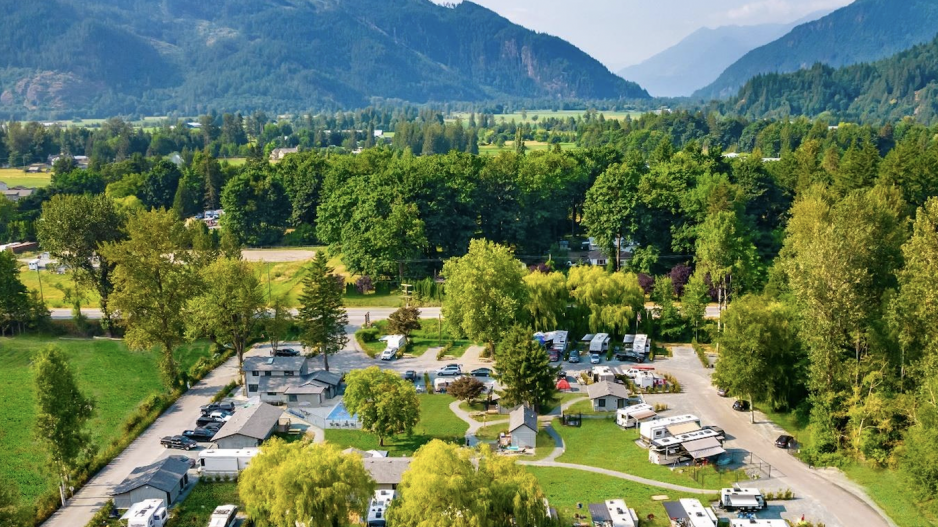Private campground operators are upgrading sites and investing in amenities as high land costs and rising expenses put an emphasis on cash flow.
The timing couldn’t be better, however. High housing costs in the run up to the pandemic saw many people swap Van city for van life, while COVID-19 spawned renewed interest in getting outdoors.
Glamping – a neologism for glamorous camping – found its feet in yurts, tipis and tree houses tricked out for appeal in the social media feeds of millennials.
But it exploded in the pandemic, says Joe Bleackley, founder and CEO of Fort Langley-based Pathfinder Ventures Inc., which operates 366 sites at locations in Parksville, Fort Langley and Agassiz.
“When you have a good product, you can have a two-year waiting list and people are willing to pay $350, $400 a night. But those customers are all kind of one-time customers,” he said. “You do the experience once, and you may not ever do it again.”
Pathfinder is considering adding glamping options to its mix, but its primary focus is amenity-rich RV sites, which offer the comforts of home away from home while serving a similar appetite for outdoor living.
“We’re tailoring to the modern-day campers,” he said. “The camping experience people want today is different from 20 years ago.”
Septic systems and electrical hook-ups are standard. The top two items on the wishlists of the campers Pathfinders serves are high-speed Internet and clean washrooms. And when they come in their RVs, they’re bringing plenty of gadgets.
“There’s air conditioners running on RVs. People come and set up their ice machines and margarita mixers. They’re using their microwaves, there’s TVs running,” he said.
And they’re setting up on a pad renting for $65 a night, compared to $213 a night, the average for the province CBRE Hotels reports.
But the amenities come at a premium to traditional tenting sites, which tend to command half the price of an RV pad – and simply don’t make financial sense given land values in the locations RVs favour. While a tenting site might be a quarter acre, Pathfinder targets 10 RV pads per acre, each one generating $10,000 revenue a year for annual revenue last year of $3.4 million.
“It doesn’t make sense to have a $25, $35-a-night tenter on a quarter-acre,” Bleackley explained. “The metrics aren’t there for tenting.”
And neither is the consumer appetite, according to Joss Penny, executive director with the BC Lodging and Campgrounds Association, which represents 400 lodging operators, campgrounds and RV parks across the province.
Airbnb RVs
RV sharing through Airbnb and other short-term rental sites gained ground alongside glamping during the pandemic, with some owners placing RVs in parks, paying the fees and letting them out to guests through the season.
“As we become more densified in the cities, and more vertical, it just makes sense that those types of people are going to camp in cabins or glamping-type units, because they’re used to that,” Penny said.
The more sophisticated the offering, the greater the revenue.
BCLCA’s annual occupancy and rate survey prepared by Align Consulting Group and released in March reports that full-service sites are on track for a 6.4 per cent increase this year to an average of $63.80. Province-wide, rates range from a low of $35 a night to $120 a night.
Occupancy was also strong last year, surpassing 2021 levels through September. While occupancies lagged in the final three months of the year, bookings through the end of December point to a strong start for 2023 despite economic headwinds and staffing challenges.
ERTCU Travel Group co-founder Kimo Linders, who organizes RV travel packages for international travellers, says bookings for 2023 are on track to surpass 2022 levels.
“We definitely do see a high interest in RVing,” he said, noting that post-COVID rebookings have given way to a wave of new bookings that point to sustained interest from travellers. “It’s definitely more than catching up on a few off years.”
This is good news for site operators, as international travellers typically rent RVs for 19 nights and stay at 14 locations throughout the trip. This spreads money around the province throughout the season in a way that domestic users typically don’t do.
“RVing is a way of holidaying that allows people to stay in areas where maybe coaches and cars would drive through,” Linders said. “People are actually staying in areas where money is needed.”
The steady cash flow, supported by fresh investment in amenities, adds up to a better use of the land than tenting sites, which are now primarily provided by BC Parks (which also offers WiFi at select locations).
Bleackley says the cap rate on Pathfinder’s Parksville location would likely be 6 per cent in the event of sale.
“Mobile home parks are in the 4s and 5s. Storage facilities are in the 4s and 5s,” he said. “The more [net operating income] we add, the more valuable our properties.”




